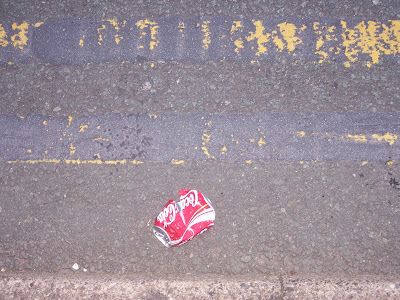… & presenting a couple of quick sketches of compositions of toilet roll tubes - the 2nd perhaps offering Morandi-esque possibilities for development - that could be said to be taking Cezanne's advice to treat nature as 'the cylinder, cone & sphere' but are in fact largely used as a pretext to mentioning a couple of examples of much more aesthetic & poetic uses of such source material & cardboard in general.


both graphite/30x21cm
Firstly, the toilet roll ‘city’ featuring in one of the wonderful hand-made animated segments of Michel Gondry’s ‘The Science of Sleep’, long-anticipated, recently watched & adored. The film itself is a constant source of invention & delight, funny, poignant & generally bonkers, with engaging performances & a pleasingly ambiguous resolution to the protagonists’ relationship: do they end up together – being obviously meant for each other – or not, other than in a dream? One must remain ever-attentive to, amongst other things, the shifts in language between English & subtitled French & live action & animation, which are also often (indeed mostly) combined to highly original & enjoyable effect. The DVD’s ‘making of’ features is a further delight, infused by the same engaging personality(ies) as the film, enlightening in terms of the behind-the-scenes secrets it reveals yet managing not to detract at all from the essential magic & poetry of the production, even serving to increase one’s amazement at & admiration of the manner in which things individually & the whole itself were achieved. The labour (of love) intensive, home-made, hand made quality of the cardboard tableaux, the Stephanie character’s ‘knitted’ soft objects, the cardboard car that features in the police ‘chase’, Stephane’s cardboard TV set, the gadgets, all are such wonderful constructions, aesthetically & inventively in their eccentricity. Watch this film & fall in love with it!



Also the fascinating paintings of William Daniels, recently discovered. Constructing maquettes of familiar paintings – anything from the Renaissance to the modern era & up to date, e.g. Georg Baselitz – from torn paper & cardboard (discarded cigarette packets, toilet roll tubes, etc), folded, ‘sculpted’ & taped, Daniels then produces highly detailed & realistic, mostly monochrome paintings of these crumpled, distressed-looking models. A relationship with Cubism seems particularly apparent, from the paintings’ colouring, tonal subtleties & the collage nature of both the models & the subsequent paintings’ style
The maquettes are interesting enough in themselves & amusing in their abject, idiosyncratic appearance, especially when traced back to their sources, e.g. a series of Cezanne’s Mont Sainte-Victoire. At first, I thought these had merely been photographed & presented as such, & were perfect enough in that, but the realisation that they are paintings – & an original twist on the still life genre, contemporary whilst referencing the history of art & establishing a dialogue with these traditions & individual artists - takes them onto a whole new level of wonder.

‘David with the Head of Goliath’ (Caravaggio)

Mont Sainte Victoire (Cezanne)
'The Forest on its Head' (Baselitz)
'L'Origin du Monde' (Courbet)
Still Life (Morandi)
(* & reading Richard Brautigan, again)




